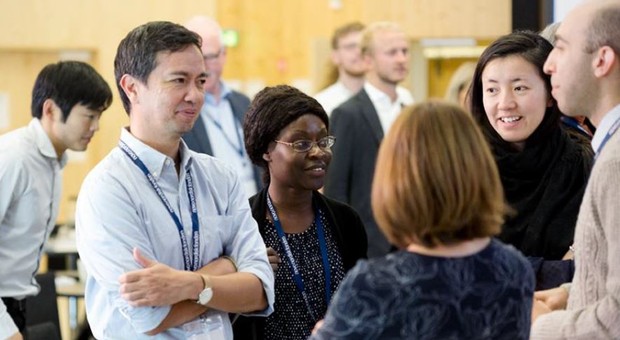How can we measure the societal impact of research? Which indicators should we use? How do we generate data most efficiently?
Those were some of the key questions discussed at the final and Fifth Edition of the International School on Research Impact Assessment (ISRIA) hosted and funded by the Novo Nordisk Foundation at Favrholm Campus in Hillerød, Denmark.
ISRIA attracted professionals from academia, public institutions, funding agencies, foundations and private companies. All of them coming to learn, share, discuss and network.
The programme was divided into six blocks focusing on the aspects of assessing the impact of research: identifying the purpose and stakeholders, defining the indicators for measurement, designing research, generating data, communication and managing assessment.
Based on the positive feedback, the participants were clearly engaged and satisfied with the content and execution of ISRIA.
“The most worthwhile professional development I have ever undertaken. Extremely well organized, both in terms of the learning outcomes and overall environment.,” James Green wrote from the University of Melbourne.
David Baxter from Gambling Research Exchange Ontario was on the same page, as he could see the relevance of ISRIA in relation to his work with research impact assessment: “Thank you very much for this wonderful event! I look forward to implementing our own assessment and collaborating with ISRIA in the future.”
A GROWING RESEARCH FIELD
Research impact assessment is a new but growing field focusing on how to measure the societal impact of research, drawing on methods and theory from a variety of disciplines. Research impact assessment is not yet very widespread because of the complexity and diversity of methods. Thus, facilitating and supporting an initiative such as ISRIA is very important. The Novo Nordisk Foundation has had its own research impact assessment team since 2014, which publishes an annual report on the societal impact of the Foundation’s grants.
Renowned academics and practitioners within the field taught and facilitated ISRIA, and the participants learned about research impact assessment through a combination of plenary and panel presentations, practical exercises and group discussions. A long list of faculty members as well as external speakers gave their perspectives, including Jonathan Haughton, Professor and Senior Economist, Beacon Hill Institute for Public Policy, Suffolk University. He presented on economic returns, giving arguments and examples of why economic impact is key to research impact assessment and for society as a whole.
“The issue of measuring the impact of research funding is definitely a difficult one, and is probably only partly solvable,” Haughton said after the conference.
THE LAST ISRIA: WHAT IS AHEAD?
This edition of ISRIA was the last of its kind in its current format. The plan is for the participants of the five schools to launch their own professional research impact assessment networks, which ISRIA has already catalysed over the years. The Vice-President of King’s College London and Co-founder of ISRIA, Jonathan Grant, made his final remarks: “By common agreement, we all thought this was the best school and a fitting end to ISRIA.”
Nevertheless, many participants favoured continuing ISRIA, such as Stefano Utili from Newcastle University: “The event was fabulous, and it was one of the very best conferences I have ever been to. Many congrats to the team. I hope that will there will be other ISRIAs, since the community really needs this school!”
Others backed this up, such as Nathalie Maillard from Warwick Business School: “Please don’t stop this excellent course.”
The Novo Nordisk Foundation awarded a grant of DKK 850,000 (€113,000) for ISRIA 2017. The School, which was founded by King’s College London and others, was held on 8–12 October.

Jonathan Grant, King’s College, co-founder of ISRIA giving a keynote speak at the first evening at ISRIA 2017.








